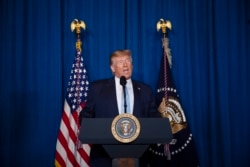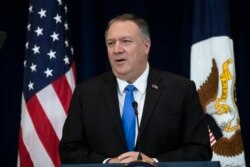VOA Persian spoke to State Department Spokesperson Morgan Ortagus on Friday about the U.S. airstrike that killed one of Iran's most powerful generals, Qassem Soleimani. Below is a transcription of the interview.
Q: What was the cost-benefit analysis that went into this decision?
A: This is obviously a decision that's a very tough decision for any president to make. But I think when President [Donald] Trump and his national security team, including Secretary of State Mike Pompeo, got together, they looked at a lot of different pieces.
It's never just one thing, but you start to look at the number of attacks that we've seen by the Iranians against the Americans in the past week. We saw one American killed and several of our service members injured in Iraq. We've also had at least 11 attacks, at least 11 in just the past two months — attacks on American facilities in the region by Iran or their proxies.
And finally but not exclusively, when you combine that with the intelligence that the U.S. received, the president was faced with a difficult decision, which is, is America safer with Qassem Soleimani dead or alive? And the president decided that the world was safer with him dead.
Q: Was there any concern that this decision could lead to a full-fledged war?
A: President Trump has always said that he does not want war, that he seeks peace with Iran, peace in the Middle East. And in fact, we took this decision in order to de-escalate and to defend ourselves.
So what we are seeking is for Iran to behave like a normal nation.
For Iran to stop being the largest state sponsor of terrorism, and for Iran to stop arming and training and funding their proxies to attack and kill, in an attempt to kill Americans, our allies, our friends, our interests in the region.
Secretary Pompeo has been very clear with Qassem Soleimani and the Iranian regime, even going back since he was CIA director in this administration. This administration has made clear that any attack on America, whether it was from Iran directly or from any of their proxies, these types of attacks on America would be met with a swift and a decisive response.
So we have exercised the maximum restraint possible despite repeated provocations and attacks from the regime and through their proxies. And finally enough was enough.
Q: Pompeo said this morning that he hopes the Iranian people see this as a step toward freedom. How could this be?
A: Sure, so we have been standing with the Iranian people as many of them have been risking their lives to protest a corrupt regime, to protest a regime that is killing and jailing innocent Iranians just because they want to protest for a better life, for an end to endemic corruption, for an end to a government that is not transparent, that is not accountable to the Iranian people.
So we stand with the Iranian people. We know they want a brighter future. We know that they want to choose their future. And we believe that the whole world should stand behind the innocent Iranians that are being persecuted by their own government.
No one was affected by the brutality and the terrorism of Qassem Soleimani more than the Iranian people themselves.
Q: Were any allies informed of the decision BEFORE the operation? ... Iraqi government?
A: I'll leave it up to President Trump to let people know who he decided to inform and who he didn't. I will note that our allies have to be constantly on guard in the region, because of the daily threat from the Iranian regime.
The Iranian regime has been terrorizing the Middle East for 40 years. They've been the aggressor for 40 years. And finally this president, President Donald J. Trump, said “enough is enough.”






